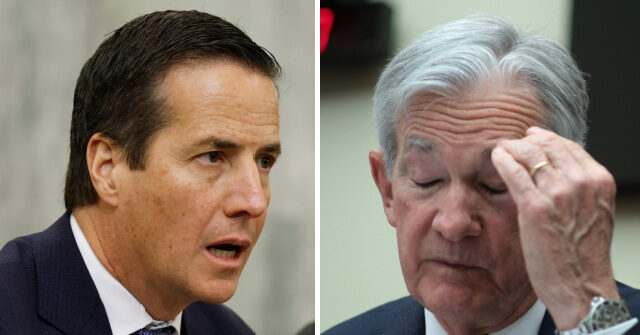Sen. Bernie Moreno (R-OH) tore into Federal Reserve Chair Jerome Powell during a tense Senate hearing accusing him of staying silent on Democrat-driven inflation while opposing President Trump’s trade policies and costing the U.S. government $400 billion a year.
In a post on X, Moreno shared a clip from the hearing with the caption:
Powell didn’t comment when Dems sent inflation soaring with Covid lockdowns, vaccine mandates, LNG export bans, and massive tax hikes. But he’s all too happy to attack President Trump’s trade agenda. He’s costing America 100s of billions and should resign.
Federal Reserve Chairman Jerome Powell testified before the Senate Banking, Housing and Urban Affairs Committee on Wednesday, where Sen. Bernie Moreno questioned whether the Fed cares about Americans earning livable wages and whether supply shocks such as vaccine mandates and energy restrictions contribute to inflation.
Moreno asked, “Did you comment during COVID lockdowns that was a bad idea, meaning that you’re shutting down the entire economy?’
“Of course not,” Powell replied.
Moreno then pointed to the Biden administration’s vaccine mandate, citing the Supreme Court’s rejection of Biden’s rule for companies with over 100 employees and the impact on workplaces where employees were fired, spaced six feet apart, or forced to quit. “If I’m running an assembly line, and now I have to put my people six feet apart, and now I have people quitting or not coming to work, or I have to fire them. That’s a supply chain shock. Wouldn’t you agree?”
Powell responded, “I mean, it’s a medical thing.”
“But it’s a supply chain shock,” Moreno stated. “I’m not asking you to make a medical decision. I’m asking you make a Fed decision on inflation.”
“Way outside anything we would comment,” Powell answered.
“But it affects inflation because supply,” Moreno responded.
“It didn’t in fact,” Powell claimed.
“Are you saying that supply chain shocks don’t affect inflation?” Moreno challenged.
“They do, but,” Powell began.
“So that’s clearly one,” Moreno said.
Moreno followed up with another example, “If you ban the export of liquid natural gas, which is going to cause a commodity price to go up, would that supply shock not also cause inflation?”
“Potentially could,” Powell remarked.
Moreno moved to the issue of corporate taxes, “Who pays corporate taxes? Is it like some obscure Wizard of Oz character behind the curtain that is a corporate entity that pays taxes? Who pays taxes?”
Powell clarified, “I mean, ultimately, it’s shareholders and customers.”
Moreno read a statement to Powell and asked him to confirm: “It’s not possible to know in advance precisely how the costs will be shared for taxes, but it is highly likely that consumers will pay a meaningful share.”
“Ultimately,” Powell agreed.
“So then taxes do raise inflation, but you don’t comment,” Moreno noted.
“I mean, they have it’s just not true,” Powell retorted.
Moreno then highlighted a letter Powell had sent stating that the Federal Reserve does not comment on trade policy. “So you don’t comment on supply shocks. You don’t comment on tax policy, which clearly affects inflation. You don’t comment on the demand pool.”
“You just said now that we should forgive student debt,” Moreno continued:
Why is a person that goes to Harvard, gets a gender studies major, pays Harvard obscene amounts of money because professors are grossly overpaid there, is that person better than a working class Ohioan that is a plumber but can’t afford a car because interest rates are too high and car prices have gone up? Why don’t we forgive that person’s car loan instead of forgiving their student loan? But you don’t comment on that. You comment on tariffs.
Powell pushed back, saying, “I don’t comment on tariffs at all actually. I comment on inflation.”
“You only commented on tariffs. You’ve only commented on…” Moreno started.
“I’m only commenting on the wisdom of tariffs,” Powell replied.
Moreno concluded with a pointed rebuke. “This is car prices. Since this year, car prices are down. Inflation in America is down. We got elected by millions of voters. You got elected by one person who doesn’t want you to be in that job. You are costing this government $400 billion a year by refusing to lower interest rates. Nobody in this chamber has that kind of power to have a $400 billion impact on this economy, on our deficit. And I just think that you should consider whether you’re really looking at this from a fiscal lens or a political lens, because you just don’t like tariffs.”
Read the full article here
